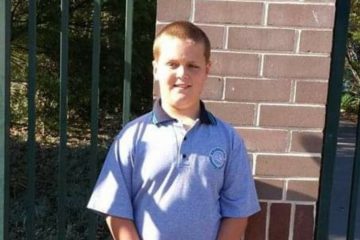When you have a child diagnosed with Sotos Syndrome it can be hard to know what is right for them school wise. There may be several options to choose from and they will range in terms of academic and emotional supports and how inclusive each setting is. What is right for one child may differ to another depending on how Sotos Syndrome presents for them. Some children struggle more with behaviour/emotional regulation and others struggle more with academics, some both. Some thrive in mainstream and some need a lot more support in a special educational setting. We wanted to share a few stories in this blog series to illustrate the range of experiences and share advice from those parents on the road already and what they have learnt so far.
Today we ‘Google Met’ with Nyssa, who is the mum of Hudson who lives in Brisbane, who has Sotos Syndrome, and she shares her experience of school with Hudson in this Q+A.
Q: Tell us a bit about Hudson, from your perspective.
Nyssa: He is 8 years old and extremely kind and caring and concerned with everyone’s happiness. For a child who did not talk until over 3, he does not stop talking. He is really good at puzzles and has just started getting into playing Xbox. He can struggle with regulating his emotions at the moment, but he is a very active boy, a bottomless pit and loves Star Wars! He can watch the same scenes over and over again. I love that he has a great relationship with his Sister, he won’t go anywhere without her.
Q: Tell us about primary school for Hudson, how did you go about choosing which one was right for him
Nyssa: I was part of a QCIE Peer Support Network, a FB group which helped to influence my thinking around school choices. We went to our local public school for an Early Childhood Development Program and I didn’t feel they were keen to take him on in prep because they seemed to be pushing me toward special school. Because I work in Disability, I am deeply passionate about inclusion and I felt very strongly about him receiving inclusive education. We didn’t have a lot of confidence in getting him into an out of catchment state school and we had left it too late to meet the enrollment deadlines for most private schools in the area, by the time we made our decision. Eventually we settled on a small catholic school. I was concerned because it was in a rougher area than our local school, but after our interview I felt confident it would be a good choice for him. They were immediately supportive of Hudson. They are a very multi-cultural school, big on anti-bullying and their moto is ‘kids who care’. Those good values aligned with what I wanted for Hudson. We were nervous, as I am not Catholic, but they were happy to accept us as a family as long as we supported the catholic values (which we do).
Q: How has Hudson found his first few years of primary school? Any challenges? If so, what have your learnt from these?
Nyssa: The school was a great choice for Hudson socially and emotionally and he has a lot of very kind friends. Unfortunately, in Queensland at least, kids don’t seem to be assessed for additional needs and funding until the end of prep (first year of school in QLD). This meant Hudson went a full year without tailored support and then entered into Grade 1 without support or additional in-class staff. In Grade 1 we had problems with him knowing when he was dirty, staying on task and wandering outside of the classroom which was a safety concern and distraction to the rest of the class.
What I found is that I need to STRONGLY advocate for him, including knowing our legal position and his entitlements to an inclusion education. We worked really closely with the school to develop a program of support. I signed up for their P&F, Hudson started Ritalin to help with his in-class behavior and the school allocated additional funding for in class support (More than he was entitled to, with a teacher aid allocated for the full week to the class) and the school agreed to allow his OT to deliver supports in class, to align with curriculum activities.
I was very lucky that my Boss’s Wife (as a special needs educator) was able to give me some great advice about how to advocate for Hudson and along with the QCIE, helped me to understand what he was entitled to receive to ensure he had fair access to education.
One of the things I found in my research, was that private schools are starting to update their inclusion policies to say they will give what they can in “reasonable” support, rather than what the student may need, so my advice would be to read a school’s disability policy carefully and question everything you don’t understand. Check how they make assessments around the funding or supports your child is eligible for as Schools receive funding and will use it as they see fit – not necessarily on your child as an individual.
I also did a lot of research on what access to education means. The Human Rights Act protected his access his education – I found that – but there is a section of the act which reduces the SCOPE. Section 36 of the Act states that Private and non-government schools are not required to comply, which I found hard to believe, but I experienced this firsthand when a Lutheran school I contacted said they didn’t have the supports that Hudson would need to provide him with an inclusive education. I later came to know this as “gatekeeping” – which is being explored in the Disability Royal Commission. But in saying that, you, like me, may not want to fight to send your child to a school that doesn’t welcome them with open arms.
In Grade 2 when Hudson was allocated a full time aide, he started to make significant progress, but unfortunately, we lost a lot of time in grade 1 and then COVID made things even harder, with him missing around 1 term of school this year. The education system just expects kids to barrel through, and his school declined our request to have him repeat Grade 2 on the basis there is no evidence that repeating is helpful in the long run. On the plus side, he has improved 4 reading levels this year, has started spelling and annoyingly uses our google home mini to spell words for fun. “Google how do you spell Beast Boy, Hulk Smash and Captain America…”
He is very popular at school and he has some great friends who look out for him and seem to be very patient and accepting.
Q: Do you have any preferences for High School?
Nyssa: We are not keen on sending him to the state school we live in catchment for. His current school have a natural transition to a local Catholic High School. He will go there as it’s a feeder school. I am open to a support unit in that high school if he needs it, he will benefit from a smaller class, but ideally, he will only leave the classroom for those areas he needs extra help and tutoring with.
Q: What advice do you have for parents
Nyssa: I’ve always focused on him being happy, accepted and included to strengthen his attitude toward learning.
My advice would be: Be very clear with the school about your child’s situation, their strengths, passions, areas where they need assistance – don’t sugar coat things, you want your child to get the support they need, and knowledge is power. But do know your rights.
Talk to other parents, find their Facebook groups, or go to open days. Ask questions of the school and don’t let them be vague in their answers. If they are, probe further. Ask open ended questions, such as how do they assess what supports are needed, allocate funding, what do YOU need to get to support that process (Reports, statements, diagnoses etc), what does the school define as ‘need’? You may have very different definitions of what your child needs to succeed, or what you see as success vs. what the school sees as success.
Lastly, if you are going to be a needy parent, you need to give back to the school. Have a voice and be prepared to get involved and give back to the school community where you can. You don’t have to sign up to the Tuckshop, but attend the meetings, ask where you can help out. At one point I even secured books for the library. The school will be more prepared to work with you if you give back, become an asset and build good relationships with staff and teachers. You need to think strategically to get the best outcomes for your child, so be strategic. It’s easier to influence someone if they like you.
Our school initially were reluctant to accept therapies coming in and “interrupting the classroom” but we have made this a win-win situation for everyone and teachers have found this time very helpful for them (being up-skilled and supported to tailor learning to Hudson’s needs). In every request we make to the school, we focus on Hudson and what is best for him and his learning environment. If the school try and make it about them, or even us as a family, we just bring it back to him – and we can usually find agreement that works for everyone.
Thank you, Nyssa, we really appreciate your time, sharing your perspective with us. No doubt many will learn a lot from reading this! If anyone else would like to be interviewed for our Sotos Syndrome Association Blog or newsletter, please email us at heather@sotos.org.au



0 Comments